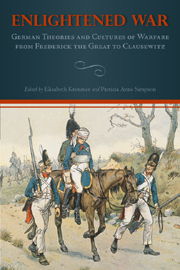Book contents
- Frontmatter
- Contents
- List of Illustrations
- Acknowledgments
- Introduction: Enlightened Warfare in Eighteenth-Century Germany
- Part I War and Enlightenment
- Part II Cultures of War in Classicism and Romanticism
- 3 Agamemnon on the Battlefield of Leipzig: Wilhelm von Humboldt on Ancient Warriors, Modern Heroes, and Bildung through War
- 4 War, Anecdotes, and the Backsides of Reason: Kleist with Kant
- 5 “Schon wieder Krieg! Der Kluge hörts nicht gern”: Goethe, Warfare, and Faust II
- 6 Recoding the Ethics of War in Grimms' Fairy Tales
- Part III War and Gender
- Part IV War and Theory
- Bibliography
- Notes on the Contributors
- Index
3 - Agamemnon on the Battlefield of Leipzig: Wilhelm von Humboldt on Ancient Warriors, Modern Heroes, and Bildung through War
from Part II - Cultures of War in Classicism and Romanticism
Published online by Cambridge University Press: 05 February 2013
- Frontmatter
- Contents
- List of Illustrations
- Acknowledgments
- Introduction: Enlightened Warfare in Eighteenth-Century Germany
- Part I War and Enlightenment
- Part II Cultures of War in Classicism and Romanticism
- 3 Agamemnon on the Battlefield of Leipzig: Wilhelm von Humboldt on Ancient Warriors, Modern Heroes, and Bildung through War
- 4 War, Anecdotes, and the Backsides of Reason: Kleist with Kant
- 5 “Schon wieder Krieg! Der Kluge hörts nicht gern”: Goethe, Warfare, and Faust II
- 6 Recoding the Ethics of War in Grimms' Fairy Tales
- Part III War and Gender
- Part IV War and Theory
- Bibliography
- Notes on the Contributors
- Index
Summary
Goethe sitzt in Weimar und dichtet die Iphigenie, draußen tobt die Schlacht von Jena und Auerstädt, sie irritiert ihn, doch er schreibt weiter, Abwegiges, aber Bleibendes, das Parzenlied.
[Goethe sits in Weimar, writing the Iphigenia, the battle of Jena and Auerstedt rages outside; it irritates him but he keeps writing, absurd, but lasting, the song of the Fates.]
— Gottfried Benn, “Drei alte Männer”Homeric Warriors and Modern Combat Surgery
IN GOTTFRIED BENN'S PHILOSOPHICAL DIALOGUE “Drei alte Männer” (Three Old Men), Goethe is seen as a distanced, Olympian writer who declines to immerse himself in the morally suspect quagmire of current politics. This is not the place to discuss the validity of this poetic statement from the late 1940s — new interpretations paint a different picture of the stance of the “Weimarer Dichterfürst” (poet prince of Weimar) toward and of his involvement in the wars of his time — but Benn certainly formulated a longstanding and influential preconception about German idealism. German artists and thinkers, so the argument goes, fled from the political landscape of the French Revolution to the Arcadian lands of Greece to consort with tragic gods and supreme artists rather than radical politicians and modern militaries.
Goethe's close friend, Wilhelm von Humboldt — living in a private museum of ancient art which Berglar calls “a dream of classical Greece reborn on the sandy grounds of the Mark Brandenburg” — was one of many German thinkers from the eighteenth to the twentieth centuries who spent most of his intellectual existence in ancient Greece.
- Type
- Chapter
- Information
- Enlightened WarGerman Theories and Cultures of Warfare from Frederick the Great to Clausewitz, pp. 75 - 102Publisher: Boydell & BrewerPrint publication year: 2011

